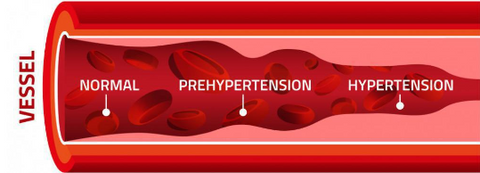In our present society, many aspects of everyday life are made better and more convenient, where classic home-cooked meals are less preferred compared to the timely and easily obtained fast food promoted by the growing fast food industry.

Followed up with the ever-common 9 to 5 work culture, which involves staring at a screen and unmoving for most hours of the day, has also caused severe health repercussions.

The health community has proven to be the two main factors that have led to the recent decline in health and life expectancy in prior decades. That being the consumption of unhealthy foods and the lack of much-needed exercise and movement.
Unknowingly giving rise to a Hidden Killer within your body.
The embodiment of “Undetected, Stealth Perfected”, Hypertension is a prime example of a silent killer. They provide no signs or discernable warnings, leaving their targets oblivious to their existence. Crippling and weakening their prey silently as they go on their day.
“Hypertension is a major cause of premature death worldwide.”
-World Health Organization (WHO)
What is hypertension?
Blood pressure is the force that circulating blood exerts against the walls of the arteries, the major blood vessels in the body.
Hypertension is when the blood pressure in your blood vessels is too high.

Common symptoms of hypertension
Most people with hypertension are largely unaware of their situation, as mentioned before, it may have no warning signs or symptoms. For this sole reason, one’s blood pressure must be measured regularly.
When symptoms do occur, they can include early morning headaches, nosebleeds, irregular heart rhythms, vision changes, and buzzing in the ears.
Severe hypertension can cause fatigue, nausea, vomiting, confusion, anxiety, chest pain, and muscle tremors.
The only way to detect hypertension is to have your blood pressure measured by a doctor. A blood pressure measurement is quick and painless. Although any individual can measure their blood pressure with automated equipment, evaluation by a healthcare professional is critical to assessing risk and associated conditions.

The complications of uncontrolled hypertension
If one decides to neglect their conditions it may lead to difficulties and other complications. Hypertension can cause excessive pressure that can harden arteries, decreasing the flow of blood and oxygen to the heart. Severely damaging the heart.
This elevated pressure and reduced blood flow can also cause:
- Chest pain, referred to as angina.
- Heart attacks, it occurs when the blood supply to the heart is blocked and heart muscle cells die from lack of oxygen.
- Heart failure, which occurs when the heart cannot pump enough blood and oxygen to other vital body organs.
- Irregular heartbeat, which can lead to sudden death.
How can the burden of hypertension be reduced?
Although chronic disease is incurable, there are many ways to help regulate and deal with the illness. That involves knowing what could be controlled and what couldn’t.
This involves two different factors that would contribute to the development of hypertension in a person. One is genetics (a non-modifiable risk), and the other relates to a person’s daily activities (a modifiable risk).
Modifiable risk factors include unhealthy diets, the lack of physical activity, consumption of tobacco and alcohol, and being overweight or obese.
Non-modifiable risk factors include a family history of hypertension, age over 65 years and co-existing diseases such as diabetes or kidney disease.

Assessing and managing these aspects would help reduce hypertension while preventing severe conditions such as heart attack, stroke, and kidney damage.
How can the burden of hypertension be reduced?
According to the guidance of the World Health Organisation (WHO) here are the recommendations for preventing and dealing with Hypertension.
Prevention
- Reducing salt intake
- Eating more fruit and vegetables.
- Being physically active regularly.
- Avoiding the use of tobacco.
- Reducing alcohol consumption.
- Limiting the intake of foods high in saturated fats.
- Eliminating/reducing trans fats in our diets.
Management
- Reducing and managing stress.
- Regularly checking blood pressure.
- Treating high blood pressure.
- Managing other medical conditions.
PPARs effects on Hypertension
The PPARs (peroxisome proliferator-activated receptors) alpha, delta, and gamma are expressed in adipocytes, skeletal muscle cells, and hepatocytes, as well as in endothelial cells, vascular smooth muscle cells, and monocytes/macrophages in different distributions
They play a crucial role in the pathophysiology of obesity, diabetes, hyperlipidemia, and hypertension, the complex of which is known as the "metabolic syndrome," as well as in their vascular complications.
In addition to modulating insulin sensitivity, PPARs can regulate oxidative stress and local production of various vasoactive substances in blood vessels, thus controlling vascular tone and vascular remodelling as one of the determinants of hypertension.

PPARs are nuclear receptor protein molecules that, when activated at the cell wall, trigger a reaction pathway that terminates in the nucleus. These proteins, which are required for glucose and lipid metabolism, are then transcribed, leading to the energy homeostasis of the cell.
Thus, PPARs alpha, delta and gamma regulate our body's metabolic mechanism of blood glucose, triglycerides and cholesterol via fat and liver cells. These isoforms may help prevent metabolic diseases such as heart disease, diabetes mellitus, obesity, hypertension and high cholesterol.

Crypto PPARs, which have the same natural properties and contain PPAR agonists, help people with insulin-dependent diabetes mellitus, cholesterol or metabolic syndrome (i.e., cholesterol, obesity, hypertension) without harmful side effects.
PPAR agonists, such as those found in Crypto, can also induce cell differentiation and apoptosis in many types of human cancer. Other noteworthy health benefits of Crypto include anti-inflammation, anti-viral, and immune regulation.

